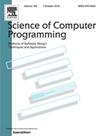Modelling and verifying BDI agents under uncertainty
IF 1.4
4区 计算机科学
Q3 COMPUTER SCIENCE, SOFTWARE ENGINEERING
引用次数: 0
Abstract
Belief-Desire-Intention (BDI) agents feature uncertain beliefs (e.g. sensor noise), probabilistic action outcomes (e.g. attempting and action and failing), and non-deterministic choices (e.g. what plan to execute next). To be safely applied in real-world scenarios we need reason about such agents, for example, we need probabilities of mission success and the strategies used to maximise this. Most agents do not currently consider uncertain beliefs, instead a belief either holds or does not. We show how to use epistemic states to model uncertain beliefs, and define a Markov Decision Process for the semantics of the Conceptual Agent Notation (Can) agent language allowing support for uncertain beliefs, non-deterministic event, plan, and intention selection, and probabilistic action outcomes. The model is executable using an automated tool—CAN-verify—that supports error checking, agent simulation, and exhaustive exploration via an encoding to Bigraphs that produces transition systems for probabilistic model checkers such as PRISM. These model checkers allow reasoning over quantitative properties and strategy synthesis. Using the example of an autonomous submarine and drone surveillance together with scalability experiments, we demonstrate our approach supports uncertain belief modelling, quantitative model checking, and strategy synthesis in practice.
不确定条件下BDI代理的建模与验证
信念-愿望-意图(BDI)代理具有不确定信念(例如传感器噪声)、概率行为结果(例如尝试、行动和失败)和非确定性选择(例如下一步执行什么计划)的特征。为了安全地应用于现实场景,我们需要对这些代理进行推理,例如,我们需要任务成功的概率和用于最大化此概率的策略。大多数代理目前不考虑不确定的信念,而是一个信念要么成立,要么不成立。我们展示了如何使用认知状态来建模不确定信念,并为概念代理符号(Can)代理语言的语义定义了一个马尔可夫决策过程,允许支持不确定信念、非确定性事件、计划和意图选择以及概率行为结果。该模型可以使用自动化工具(can -verify)来执行,该工具支持错误检查、代理模拟和通过对Bigraphs的编码进行详尽的探索,从而为概率模型检查器(如PRISM)生成转换系统。这些模型检查器允许对定量属性和策略综合进行推理。通过自主潜艇和无人机监视的例子以及可扩展性实验,我们证明了我们的方法在实践中支持不确定信念建模、定量模型检查和策略综合。
本文章由计算机程序翻译,如有差异,请以英文原文为准。
求助全文
约1分钟内获得全文
求助全文
来源期刊

Science of Computer Programming
工程技术-计算机:软件工程
CiteScore
3.80
自引率
0.00%
发文量
76
审稿时长
67 days
期刊介绍:
Science of Computer Programming is dedicated to the distribution of research results in the areas of software systems development, use and maintenance, including the software aspects of hardware design.
The journal has a wide scope ranging from the many facets of methodological foundations to the details of technical issues andthe aspects of industrial practice.
The subjects of interest to SCP cover the entire spectrum of methods for the entire life cycle of software systems, including
• Requirements, specification, design, validation, verification, coding, testing, maintenance, metrics and renovation of software;
• Design, implementation and evaluation of programming languages;
• Programming environments, development tools, visualisation and animation;
• Management of the development process;
• Human factors in software, software for social interaction, software for social computing;
• Cyber physical systems, and software for the interaction between the physical and the machine;
• Software aspects of infrastructure services, system administration, and network management.
 求助内容:
求助内容: 应助结果提醒方式:
应助结果提醒方式:


